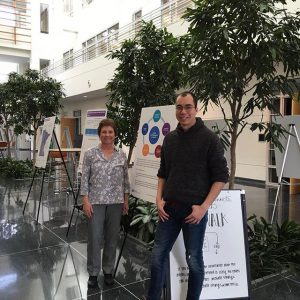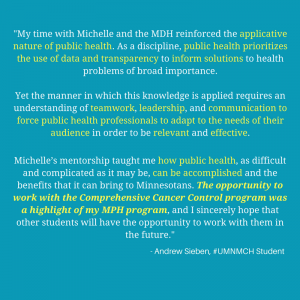By Andrew Sieban
 As an undergraduate biochemist, learning how to communicate to a variety of audiences was not a skill that I prioritized. I knew little about the intricacies of public health and how it was actually pursued and accomplished before starting my Master of Public Health (MPH) program. My familiarity was with data, but how data were translated into practical solutions, and how public and private stakeholders coordinated with each other to realize those solutions, were details with which I did not involve myself.
As an undergraduate biochemist, learning how to communicate to a variety of audiences was not a skill that I prioritized. I knew little about the intricacies of public health and how it was actually pursued and accomplished before starting my Master of Public Health (MPH) program. My familiarity was with data, but how data were translated into practical solutions, and how public and private stakeholders coordinated with each other to realize those solutions, were details with which I did not involve myself.
During the second year of my MPH degree, I had the opportunity to work with Michelle Strangis, JD, MPH, in the Minnesota Department of Health’s (MDH) Comprehensive Cancer Control program. I originally thought that the position would entail compiling current data on cancer topics to inform public policy; I quickly learned that my responsibilities included this and more.
Much of my work at the MDH was preparing for the annual Cancer Summit, during which various stakeholders across Minnesota would meet, discuss, and coordinate strategies to address the cancer burden on Minnesotans. The Summit would showcase Minnesota’s new Cancer Plan, a list of priorities that would direct the efforts of public and private agencies for the next 10 years. I found that my work required a wide-ranging mixture of data compilation, database management, communication, and stakeholder coordination—all relevant to the work of any public health professional.
Under Michelle’s guidance, I worked with othe rs in the Cancer Control program to create a data walk highlighting the importance of social determinants of health in shaping cancer burden and impacting health outcomes. The experience provided substantial exposure to various data sources available in Minnesota, as well as areas that still need improvement. The project required selection of data that would be of interest to cancer care professionals, yet communicated in a way that was readily digestible and informative. I quickly discovered that many of the associations between social determinants and well-being are not readily understood by those outside of public health circles. Learning how to introduce people to these important principles was an invaluable part of my work at the MDH and it is something that I will apply in my future work.
rs in the Cancer Control program to create a data walk highlighting the importance of social determinants of health in shaping cancer burden and impacting health outcomes. The experience provided substantial exposure to various data sources available in Minnesota, as well as areas that still need improvement. The project required selection of data that would be of interest to cancer care professionals, yet communicated in a way that was readily digestible and informative. I quickly discovered that many of the associations between social determinants and well-being are not readily understood by those outside of public health circles. Learning how to introduce people to these important principles was an invaluable part of my work at the MDH and it is something that I will apply in my future work.
I also saw how crucial coordination between various stakeholders, both public and private, was needed to address the variety of burdens facing cancer patients in Minnesota. The capacity of any one organization, be it a healthcare system, a non-profit, a hospital, or a state agency, was not enough to bring sustained change to the persistent public health issues across the state. Conversation between these communities was necessary to identify where cancer issues were located and how they might be addressed. Despite the difficulties involved with stimulating cooperation, the work of the Cancer Control program highlighted the possibilities of working together and combining the resources of both the public and private sector to address health needs across Minnesota.
My time with Michelle and the MDH reinforced the applicative nature of public health. As a discipline, public health prioritizes the use of data and transparency to inform solutions to health problems of broad importance. Yet the manner in which this knowledge is applied requires an understanding of teamwork, leadership, and communication to force public health professionals to adapt to the needs of their audience in order to be relevant and effective. Michelle’s mentorship taught me how public health, as difficult and complicated as it may be, can be accomplished and the benefits that it can bring to Minnesotans. The opportunity to work with the Comprehensive Cancer Control program was a highlight of my MPH program, and I sincerely hope that other students will have the opportunity to work with them in the future.
After studying biochemistry as an undergraduate and working in a gynecologic oncology laboratory for two years, Andrew entered the MPH program to gain a broader perspective on health and public policy. He is interested in studying bioethics, the intersection of infectious disease, ecology, and evolutionary biology, as well as the implications public policy has on vulnerable populations. Andrew plans on completing his MPH in the fall of 2017.
Read Student Spotlight Archives
Interested in learning more about getting a degree in Maternal and Child Health? Visit our MCH Program page for more information.
#UMNMCH #UMNproud #UMNdriven